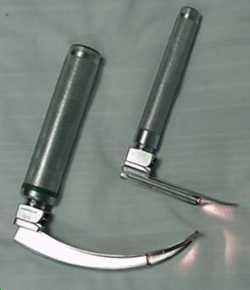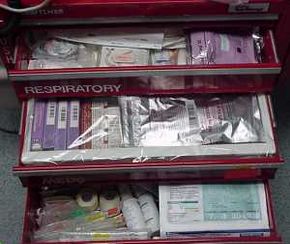Crash Cart
A crash cart is a cabinet containing equipment that physicians and nurses need when a cardiac arrest occurs (the heart stops beating). This is obviously a grave situation and requires immediate life-saving steps. These are some of the items found on a crash cart:
- Defibrillator - This is an electrical device with two paddles that are placed on your chest. It discharges electricity through your heart when a lethal rhythm is present. The goal is to shock the heart back to normal. "Lethal rhythms" include ventricular fibrillation (rapid, unsynchronized, uncoordinated heartbeat) and ventricular tachycardia (rapid heartbeat that prevents the heart from pumping properly). It can also be used in less dangerous rhythms to return the heart to a normal rhythm.

- Endotracheal intubation equipment - Endotracheal intubation is the procedure of placing a tube into someone's trachea (windpipe) when that person stops breathing or is not breathing adequately. The tube allows artificial respiration equipment to take over the job of breathing for the patient. The package includes tubes of different sizes and a laryngoscope -- a special light with a flat metal piece to lift the tongue out of the way so that a tube can be placed into the trachea.
- Central vein catheters - These are catheters (small tubes) placed in the large central veins (near the heart) so that medications and fluids can reach the heart and important organs quickly.
- Cardiac drugs - During a cardiac arrest, certain potent drugs are required to restart the heart or return it to a more stable rhythm.
The most common lethal arrhythmias present during a cardiac arrest are:
Advertisement
- Ventricular fibrillation - Twitching of the ventricle (main chamber of the heart), as opposed to an effective contraction that pumps blood out of the heart
- Ventricular Tachycardia - Rapid contraction of the ventricle, producing insufficient blood flow out of the heart
- Asystole - Total absence of electrical activity and therefore no contraction of the heart
- Pulseless electrical activity (PEA) - Electrical activity of the heart but inadequate contraction of the heart
- Bradycardia - Various rhythms that cause the heart to beat so slowly that not enough blood is pumped out of the heart
Some of the drugs that are used to treat these arrhythmias are:
- Epinephrine - Used in ventricular fibrillation, pulseless ventricular tachycardia, asystole, PEA, and sometimes bradycardia
- Atropine - Used in asystole, bradycardia and sometimes PEA
- Lidocaine - Used in ventricular fibrillation and ventricular tachycardia
There are many other pieces of equipment that are used in an emergency department, including the chest-tube tray, which holds the equipment needed to put in a chest tube (a tube placed between the ribs and the lung to re-expand a collapsed lung), and an ear, nose and throat tray, which holds specialized equipment used most commonly for nosebleeds and to remove foreign bodies from the ear, nose, or throat.
